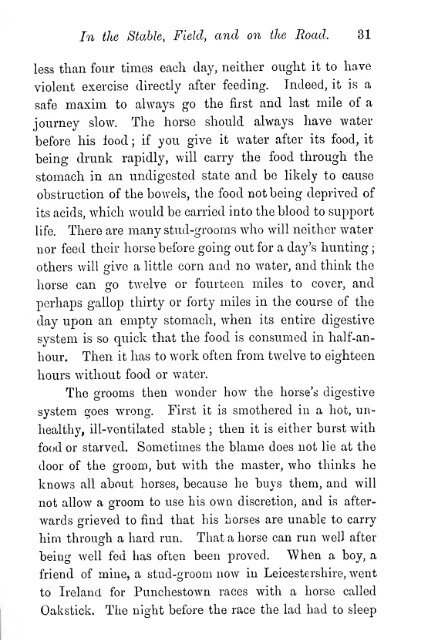The management and treatment of the horse in the stable, field, and ...
The management and treatment of the horse in the stable, field, and ...
The management and treatment of the horse in the stable, field, and ...
Create successful ePaper yourself
Turn your PDF publications into a flip-book with our unique Google optimized e-Paper software.
In <strong>the</strong> Stable, Field, <strong>and</strong> on <strong>the</strong> Road. 31<br />
less than four times each day, nei<strong>the</strong>r ought it to have<br />
violent exercise directly after feed<strong>in</strong>g. Indeed, it is a<br />
safe maxim to always go <strong>the</strong> first <strong>and</strong> last mile <strong>of</strong> a<br />
journey slow. <strong>The</strong> <strong>horse</strong> should always have water<br />
before his food ; if you give it water after its food, it<br />
be<strong>in</strong>g drunk rapidly, will carry <strong>the</strong> food through <strong>the</strong><br />
stomach <strong>in</strong> an undigested state <strong>and</strong> be likely to cause<br />
obstruction <strong>of</strong> <strong>the</strong> bowels, <strong>the</strong> food not be<strong>in</strong>g deprived <strong>of</strong><br />
its acids, which would be carried <strong>in</strong>to <strong>the</strong> blood to support<br />
life. <strong>The</strong>re are many stud-grooms who will nei<strong>the</strong>r water<br />
nor feed <strong>the</strong>ir <strong>horse</strong> before go<strong>in</strong>g out for a day's hunt<strong>in</strong>g<br />
o<strong>the</strong>rs will give a little corn <strong>and</strong> no water, <strong>and</strong> th<strong>in</strong>k <strong>the</strong><br />
<strong>horse</strong> can go twelve or fourteen miles to cover, <strong>and</strong><br />
perhaps gallop thirty or forty miles <strong>in</strong> <strong>the</strong> course <strong>of</strong> <strong>the</strong><br />
day upon an empty stomach, when its entire digestive<br />
system is so quick that <strong>the</strong> food is consumed <strong>in</strong> half-an-<br />
hour. <strong>The</strong>n it has to work <strong>of</strong>ten from twelve to eighteen<br />
hours without food or water.<br />
<strong>The</strong> grooms <strong>the</strong>n wonder how <strong>the</strong> <strong>horse</strong>'s digestive<br />
system goes wrong. First it is smo<strong>the</strong>red <strong>in</strong> a hot, un-<br />
healthy, ill-ventilated <strong>stable</strong> ; <strong>the</strong>n it is ei<strong>the</strong>r burst with<br />
food or starved. Sometimes <strong>the</strong> blame does not lie at <strong>the</strong><br />
door <strong>of</strong> <strong>the</strong> groom, but with <strong>the</strong> master, who th<strong>in</strong>ks he<br />
knows all about <strong>horse</strong>s, because he buys <strong>the</strong>m, <strong>and</strong> will<br />
not allow a groom to use his own discretion, <strong>and</strong> is after-<br />
wards grieved to f<strong>in</strong>d that his <strong>horse</strong>s are unable to carry<br />
him through a hard run. That a <strong>horse</strong> can run well after<br />
be<strong>in</strong>g well fed has <strong>of</strong>ten been proved. "When a boy, a<br />
friend <strong>of</strong> m<strong>in</strong>e, a stud-groom now <strong>in</strong> Leicestershire, went<br />
to Irel<strong>and</strong> for Punchestown races with a <strong>horse</strong> called<br />
Oakstick. <strong>The</strong> night before <strong>the</strong> race <strong>the</strong> lad had to sleep
















